| MIATA BUILD |
|
|
 |  | 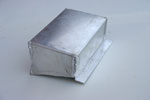 | February 27, 2008 - The cardboard template, transformed into aluminum.
I've never welded aluminum before, but after all of the TIG practice with the header I found it really easy. The biggest difference was how the filler rod melted - and it was really fun to simply melt the seams together with no filler at all. I could get to enjoy doing this. After the picture was taken, a bit of work with a wire wheel cleaned up some rough edges on the cuts.
Next, to make it lighter (not that there was a problem in that regard!) I decided to cut some holes in it. Looks as if my hole saws were intended for wood, not metal. Whoops. The holes were rather ugly looking and the saw kinda wandered around. No worries, I was planning to paint the bracket black anyhow. Raw aluminum looks cooler and more racy, but is far more likely to reflect on the windshield.
entry 416 - tags: computer |  |  | 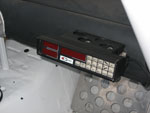 | February 27, 2008 - The Coralba, fully installed.
The bracket turned out to be immensely stable, making the computer a solid part of the car. That's good. It also weighs next to nothing, also good.
The computer is partially wired in, enough that I can verify that it's functioning. Good news, the modified ABS wheel sensor appears to be working perfectly. I did a rough calibration using the car's odometer and drove around town pretending I was on a stage. It's a very cool little unit with a lot of capability, and thus it will take a bit of work to understand it properly.
Other than the wheel sensor, I also wired in the reverse signal. This prevents the odometer from adding distance when the car is reversing. I can add a second remote to the computer if this feature is ignored, which can be used to finish a stage and display all the useful information. Hmm, I'll ask Janel which she wants. She was very excited about the reversing feature though. I sure hope she wants to keep it, it took me an hour to splice in one wire due to the position of that wiring harness. Ouch.
entry 417 - tags: ergonomics, wiring, computer |  |  | 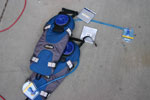 | February 27, 2008 - Since the Targa involves long days - and a full week of those - it's important to stay hydrated.
These Camelbak "Unbottles" are going to get mounted in the car so we always have water available. Here in the desert it's also important to stay watered, and I've found I drink far more water when cycling when I'm using a Camelbak instead of a bottle.
The Unbottles are different than normal Camelbaks in that they don't have shoulder straps. Instead, they're designed to be strapped in using various methods. That's perfect for us.
entry 418 - tags: ergonomics |  |  |  | February 27, 2008 - On the driver's side, there's room for the Camelbak to sit between the seat and the roll cage.
A strap on the top of the Unbottle lets me hook it into place so it won't move. Perfect. Now I just need to figure out how to fit one around the navigator's seat. That seat is moved further aft and there's no room between the seat and bulkhead.
The intercom plugs and water tube are attached to the shoulder straps via some clever little velcro ties. They're more secure and easier to remove than the elastic band I was using before.
entry 419 - tags: ergonomics |  |  | February 28, 2008 - The car's back from the alignment shop.
Just like last time, the left front won't get as much camber as I'd like. As I've (probably) mentioned before, I'm experimenting a bit with the alignment on this car and running more camber than I usually do. Right now, it's got a "traditional" alignment like I've been using for years. That's not such a terrible thing, but I'm a bit disappointed I can't try the new setup. Maybe I'll bung a couple of adjustable bushings in that control arm. I'll have full access to an alignment machine in a month or two.
So the car's looking pretty complete now. Why the recent improvements? There's a track day coming up next weekend at Pueblo. Janel and I will be testing the intercom, computer and general compatibility in-car. It should be fun.
entry 420 - tags: suspension |  |  | February 28, 2008 - I've always wanted a license plate that says CON BRIO.
What can I say, it's the result of a musical education. It means "with life, with spirit" and I've always felt it summed up a sports car.
Eric pointed out to me today that the ideal plate for the Targa car would be "allegro ma non troppo". Fast, but not too fast. Perfect! Although I'm not sure it's going to fit on a plate.
entry 421 |  |  | February 28, 2008 - For sale - two seats in the Targa Newfoundland driving school. Due to logistical problems, we're not going to be able to attend the Targa Newfoundland school put on by Open Road Motorsports.
By all accounts, this is an excellent school that's highly recommended for any Targa competitor. We'd go if we could. But we can't.
We paid $795 for our entry, so that's what we're asking for our seats. If you sign up for a 2008 school now, you'll pay $1045. It's an excellent opportunity to save $250.
School website
Sold!
entry 422 - tags: for sale |  |  | February 29, 2008 - I did a bit of autotuning on the way in to work.
The long way, of course. After looking at the changes, it appears the engine is hungry for all sorts of extra fuel up top. This is excellent, as it implies the engine is making more power. Yay! The car should hit the dyno on Monday and then I'll know a bit more. Jeremy at Flyin' Miata took a look at the maps and massaged them somewhat, so I have a better starting point for more autotuning on the weekend.
I also discovered that the Coralba shuts down when the headlights are on. Interesting. I'll have to trace that one back and find out what's going on. Running lights are fine, it's just the main lights that shut it down.
entry 423 - tags: tuning, wiring, computer |  |  | February 29, 2008 - Aha!
The relationship between the rally computer and the headlights is now clear. It started when I went looking for an unswitched power supply for the computer. The last thing I wanted was for me to accidentally reset the computer by turning off the ignition, you see, as then I would have to face the wrath of Janel and the potential of a retaliatory "flat left over crest into rock wall" call further along in a stage. I installed a separate switch for the computer instead. Anyhow, right beside the switch was the headlight retractor switch. It has unswitched power. So I tee'd into that.
Well, it turns out that when the headlights are powered up, the electricity to the retractor switch is cut off. Makes sense, you don't want someone dropping the lights when they're supposed to be up. But this nicely cut the power to the Coralba at the same time. I can't see this in the wiring diagram, but a check with the test light confirmed that's what was going on.
I had a handy wire coiled up behind the dash that was labelled "BATT +". See, I'd been thinking ahead. But it didn't work. I pulled out a wiring diagram and it seemed as if it should. But it wasn't used for anything else. So I checked the fusebox. Aha! A blown fuse. Popping in a new one lit up the wire and it was a simple matter of teasing it out of the harness and rerouting it to the back of my computer switch.
This was one of those examples where doing something else paid off. My brain kept flipping through options until the "retractors don't work when the lights are on" solution came to mind.
entry 424 - tags: wiring, computer |  |  | 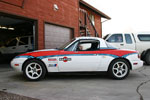 | March 1, 2008 - I think this will be the final ride height for the car.
I usually measure from the center of the hub to the bottom of the fender, as that's a measurement that's independent of wheel/tire sizing. It's about 13" front, 13.25" rear. Just to be more accurate, I decided to use the bottom of the frame rails to confirm the car was sitting level. After all, my fenders have been a little reshaped. Turns out I was dead on on all four corners. Good!
I like the stance. It's obviously not a road racer, but it looks capable. I have ground clearance and lots of travel, but the car's not unstable. We'll see how it likes the track next weekend.
entry 425 - tags: suspension |  |  | 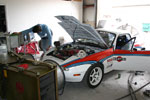 | March 4, 2008 - The moment of truth for the header.
Did all that work actually get me anything? In short, yes! I saw a gain of 15 lb-ft at 3500 rpm and around 10 hp at 5200 rpm. Cue the happy dance.
The car sure sounded different, as you could hear some strong resonances and beats coming from underhood. That's good, the header is all about resonant frequencies.
On the dyno run, you can see the Racing Beat header in blue and the new one in red. Other than a minor loss between 4000-4500 rpm, the new one is a winner right across the board. It didn't unplug the engine above 6000 rpm as I'd hoped, but a big slug of torque across the range is a lot more useful on the Targa.
Dyno chart
Now, the engine still isn't anywhere near its potential. Keep that in mind when looking at the dyno chart. I don't know if my 200 hp at the wheels goal is attainable, but 170 should be possible. The cams are under suspicion, as sister engines to this one have held power a bit longer without giving up the bottom end. I have another couple of options to try and there hasn't been any experimentation with the cam gears yet. Since they typically trade off low end for high end and vice versa, I don't think they're going to solve things overall. Still, it's worth trying.
Jeremy Ferber from Flyin' Miata was the tuning meister, working in temporary conditions as FM is in the middle of a move.
It wasn't all good news, though. It turns out the car has a problem with the wideband O2 sensor, so we couldn't do a whole lot with tuning. Normally, Jeremy has enough experience to tune via injector pulse width against horsepower, but the 2001 injectors I'm using aren't in his mental program. So I'll be doing a little diagnosis to sort that out - we suspect the heater circuit isn't working. The car was also running hotter than it should, so I'll take a look to make sure the thermostat is working properly.
entry 426 - tags: header, engine, dyno |  |  | 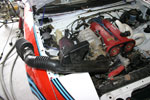 | March 4, 2008 - Despite the problems, we did get a chance for some comparative testing on the dyno.
My temporary intake pulled hot air from behind the radiator. That's one reason it was temporary, and why it was mounted upside down in the previous picture of the car on the dyno.
For interest's sake, we pulled out a stock 1994 intake tract that includes a resonating Heimholtz chamber. It's not perfectly sized for my engine - I believe the theory says it should be equivalent to 1.5 cylinders worth of displacement - but it was worth trying. And whaddya know, it did something! Nothing major, but 4 lb-ft at 4000 rpm for free is nothing to complain about. The red graph is the stock setup.
Dyno chart
Using the stock crossover tube will also let me put the filter in a cooler place than right behind the rad, which will reap benefits in the real world where having a filter sticking through the hood is awkward to arrange.
In the picture, you can see the filter from my original intake resting inside the engine bay. Don't be fooled, we don't have some sort of bizarre dual-filter setup going here.
entry 427 - tags: engine, dyno, intake |  |  | March 5, 2008 - As expected, some people have been focusing in on the peak horsepower of the engine and scoffing.
Sure, that's understandable. It would be an expensive engine to buy and it's not making the headline horsepower numbers that people expect to see. But it's also not finished development yet, and it's doing well in the range I need for the Targa. I'll get those headline numbers eventually, although the driver and suspension are more important at this point.
In the meantime, here's a comparison between a fully built CSP-legal 1.8 with 10.5:1 compression. It's a pretty nice engine and the car feels quick. Which of these would be faster on the road?
2.0 vs 1.8 dyno chart
entry 428 - tags: engine |  |  | 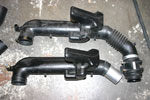 | March 6, 2008 - The stock intake needed to be modified to fit my car.
The biggest problem was the big loop in the #1 runner in the header. The stock setup basically drove directly into that. Not good. So, a little bit of trimming and a chunk of pipe later, and voila! The tube is made of hard rubber, so it fit around the pipe really nicely. A clamp ensures nothing comes free.
On the left side of the picture, you can see how my air temperature sensor fits in the bung originally used for the idle speed control valve intake on this 1994 part. On my 1999 throttle body, that intake is inside the throttle body so the fitting is unused. The air temperature sensor screwed right in there tightly as if it was meant to be installed in this location.
entry 429 - tags: intake, engine |  |  | 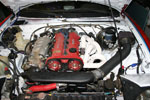 | March 6, 2008 - The intake in place.
Okay, that black plastic/rubber crossover tube isn't really very sexy. But it works, and that's what counts here.
There's a bracket supporting the crossover tube at the short piece of pipe, then another supporting the air filter. It's not an ideal spot for the filter, really, but I'll make a heat shield to protect it - and the brake lines - from the header heat before too long. That flexible hose isn't as tightly stretched as it appears in this picture, by the way.
Speaking of the header, note what happens when you forget to degrease the pipes before painting with high-temp paint. Whoops.
I also sorted out the wideband oxygen sensor problem. It appears to have been a bad heater in the sensor. I popped in another to check it out, and on a test drive I saw a good range of numbers. The old sensor would work fine until exhaust flow got high, then it would just sit at 14.7:1. The new one showed numbers as rich at 10:1 under wide open throttle. Obviously not good for power, but at least I know the sensor's working! I'll let the car autotune itself at the track this weekend. I don't think I'll have time to dyno the car tomorrow.
entry 430 - tags: intake, header, engine |  |  |  | March 10, 2008 - Time for another test.
After a long tow through some nasty weather (check out that filthy hood!), we made it to Pueblo for the most recent testing session. The goals for this one were primarily to work on the driver/navigator team, although as always suspension tuning was involved.
After a late start due to a car that was stuck on the track with the doors locked and the engine running (!), I took the car out solo in wet (and rapidly drying) conditions. The brakes didn't feel good. A nice solid pedal, yes. But I wasn't getting much feedback. This kept up over the whole day so I'm not sure what's going on or if it was just a matter of a lack of faith on my part. Since I was planning on making some big changes to the pads shortly, I'll look at them more closely later.
The car felt pretty good. The handling balance with the new alignment wasn't right on the first session, it was a bit too biased towards understeer as I'd expected. Not terrible and certainly stable, but I do generally prefer a car that's set up to be a bit on the loose side. The suspension was swallowing up just about everything. Just about?
The final turn has been reconfigured to make it much tighter than before. It will be repaved this summer, but for the time being it's rough. Really rough. There was a deep dip in the pavement right past the apex that was bottoming out the suspension hard. When I crawled under the car to do some sway bar adjustments, I noticed that the left rear spring had marks indicating it had hit coil bind. Ahh, that's not good. The fairly high ride height and the 8" springs were a bad combination. Since I didn't have any way to deal with it, I played with the corner to avoid that hole for the rest of the day. Elsewhere on the track, I was able to drive over berms - even the rough "dragon's teeth" ones - with impunity. So that was working well. Despite a slight understeer in fast sweepers, the car was both faithful and mobile when I was setting up for corners so it's probably a pretty safe setup for the Targa now. It was quick enough to let me pass a Lotus Elise without any difficulty, that's a good sign.
I'm going to try a couple of things to sort out that coil bind. There are a set of 10" springs on the way to replace my 8" ones, as they'll give an extra 1.25" of spring travel and that will avoid the binding. They're a 250 instead of my current 225 so I can make the rear slightly more mobile. I also ordered some 375 lb springs, thinking I could try a 375/300 combination instead of my current 300/225. The stiffer springs not only give an extra 0.5" of spring travel, they'll use a lower perch height for the same ride height so binding should not be a problem. Now, do I want the extra stiffness or do I keep the car fairly soft? I'll have both options available to me.
The header worked perfectly all day, not showing any signs of weakness or cracking. That's good.
entry 431 - tags: testing, suspension, header |  |  |  | March 10, 2008 - What about in the car?
Once I'd roused Janel from the comfort of a warm tow vehicle, we discovered that our concerns about nausea were unfounded. With the rally computer to play with, she was distracted and forgot to get sick. Excellent!
The intercom worked well, allowing me to hear her clearly. She couldn't hear me quite as well - probably because the speakers were further from her ears - but that's a good setup. I did discover how hard it is to concentrate on driving quickly while also carrying on a conversation about how the trip computer works. Once the communication became more one-way, I was able to work better on dealing with the inputs.
For one session, she brought along a book and read it to me. Seems like an odd test, but we didn't have pace notes for the track, you see. Again, no problems with nausea as long as she kept her legs braced and didn't let them flop around. So the track day was a good test then. We learned a few things, that was the goal.
Eric asked for a picture of the whole interior in the mostly-final configuration. Here you go!
entry 432 - tags: testing, skills, computer, intercom |  |  |  | March 10, 2008 - A very serious sticker.
I saw some spy shots of the Porsche Panamerica taken in South Africa. They had this sticker. I had to have one, so a friend duplicated it for me.
The track day wasn't all work on the race car. I got to drive the FM Westfield, now with 100% more turbocharger. Holy cow, it was a great ride. The chassis of the Westfield was easily able to deal with the horsepower, and it became a massively fast machine. It had a better power/weight ratio than the Atom I drove almost a year ago, while also having a much better gearshift and more exploitable handling. It's a beast.
Another car that I got to drive was a V8 powered MGB GT. It made a wonderful noise. It wasn't fast - there's still a lot of work to do on the car - but the combination of the shape in BRG and the rumble was compelling. There's an advantage to hanging out in the pits wearing a driver's suit and playing with an obvious race car - people ask you to drive their cars and want to know what you think!
entry 433 - tags: other cars |  |  | March 12, 2008 - Back on the dyno.
I took the long (loooong) way in to work this morning to make sure the wideband was working well. Other than a really slow warm-up time, it seemed to be. But when we strapped the car to the dyno, it was misbehaving by the third run. This is really frustrating. Time to do some more diagnosis - the guys at Hydra want me to try a different ECU.
I didn't do any cam testing as I'd hoped, so instead we basically just repeated what we'd done before - but we pulled out a bit of the excess fuel and put in a degree of timing. Nothing to make any difference to the curves.
Instead, I'll probably end up swapping cams at home, then using the autotune feature of the ECU to see if it wants to add fuel. Crude, but it'll give me a rough idea of what's happening. Then it'll go back on the dyno in a few weeks.
entry 434 - tags: engine, dyno |  |  |  | March 13, 2008 - This is what coil bind looks like.
See the marks on the springs where the coils came together? Not good. What's interesting is that the right side is almost completely free of marks. The perch on that side was 8mm lower. That's the margin of error I was dealing with. Why did this happen? Because I put the wrong bumpstop for my ride height in the shocks. Whoops.
No worries, I have others. I also have those 10" springs coming. The big question is - do I try the 375/300 combination, or do I install the 300/250?
entry 435 - tags: suspension |  |  |
|

 THE DIARY
THE DIARY